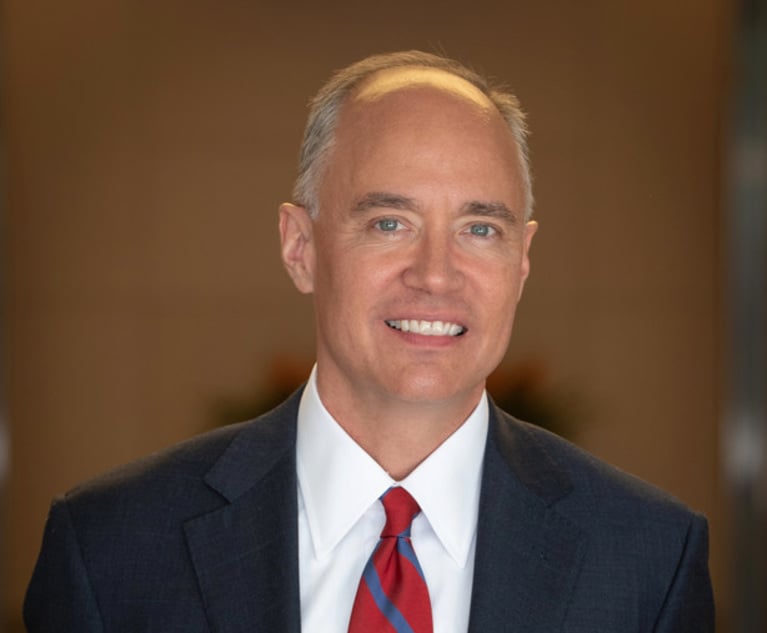Reopening Texas: A Q&A With David Coale
Dallas attorney David Coale spoke recently with Texas Lawyer and discussed who has the authority to decide when Texas businesses reopen.
April 24, 2020 at 05:22 PM
4 minute read
 David Coale, an attorney with Lynn Pinker Hurst & Schwegmann.
David Coale, an attorney with Lynn Pinker Hurst & Schwegmann.
Texas Gov. Greg Abbott is expected to make an announcement soon allowing some businesses to reopen. Texans are anticipating that hair and nail salons, spas and pet groomers, movie theaters and churches, which have been closed since Abbott gave the statewide shutdown order March 31 to slow the spread of the coronavirus, could reopen as early as next week.
Despite the encouraging news, there has been some static due to sometimes-conflicting orders coming from policymakers ranging all the way from Abbott and county judges to mayors. As a result, Texans are asking: Who has the authority to enforce the rules, and which ones should people follow?
Texas Lawyer had the chance to speak recently with David Coale, a Dallas attorney and an expert on government-power issues, about who has the authority to decide when Texas businesses reopen.
Who has the authority to reopen Texas businesses?
David Coale: According to the Texas law, the governor has the authority to declare when the state can reopen. Since this outbreak is a public health issue, our Government Code gives the governor ultimate authority over the county judges and the mayors. If the effective date of the governor's order ends, however, leaving no inconsistency between his order and those of a county and city, then any orders given by a county judge or a mayor will be in effect.
What is the hierarchy of government power when it comes to a health emergency like the one we are experiencing now with COVID-19?
Texas law gives the governor the ultimate authority over a county judge or a mayor. Under the Constitution, the federal government is "supreme" over state government, but the Constitution gives the federal government only limited power over a public health emergency compared to that of the states. In practice, the federal government can provide guidelines that the states can follow, but it is up to the governors to make decisions for their states.
Again, if a governor's order ends and a county judge or a mayor wants to supplement it with their own order going forward, then, according to the law, those citizens are asked to abide by the orders of a county judge or mayor. But if a county or local order conflicts with the governor's order, then the governor's authority supersedes a county judge or a mayor's order.
Where will the trouble spots be when Gov. Abbott gives the order?
The order does not require a business to take an action such as reopening if the owner does not believe that step is in the best interest of the business, its employees or customers. Social distancing and other restrictions remain in place, so I would only envision a problem if a business opens but fails to abide by the governor's order. There may also be problems about the definition of certain categories of business[es] and business activities.
When will Gov. Abbott reopen the state's businesses and how will he do it?
I believe the governor plans to make an announcement soon on further expanding the current retail-to-go guidelines for retailers and allow other businesses to reopen under similar guidelines. The timing and details remain to be seen. But he could certainly order that restrictions for certain less populated or less affected counties be reduced while keeping restrictions on urban counties in place.
David Coale is an attorney and expert on government-power issues. He practices at Lynn Pinker Hurst & Schwegmann.
This content has been archived. It is available through our partners, LexisNexis® and Bloomberg Law.
To view this content, please continue to their sites.
Not a Lexis Subscriber?
Subscribe Now
Not a Bloomberg Law Subscriber?
Subscribe Now
NOT FOR REPRINT
© 2025 ALM Global, LLC, All Rights Reserved. Request academic re-use from www.copyright.com. All other uses, submit a request to [email protected]. For more information visit Asset & Logo Licensing.
You Might Like
View All
Special Counsel Jack Smith Prepares Final Report as Trump Opposes Its Release
4 minute read
Patent Disputes Over SharkNinja, Dyson Products Nearing Resolution

Revisiting the Boundaries Between Proper and Improper Argument: 10 Years Later
8 minute read
'Serious Disruptions'?: Federal Courts Brace for Government Shutdown Threat
3 minute readTrending Stories
- 1'It's Not Going to Be Pretty': PayPal, Capital One Face Novel Class Actions Over 'Poaching' Commissions Owed Influencers
- 211th Circuit Rejects Trump's Emergency Request as DOJ Prepares to Release Special Counsel's Final Report
- 3Supreme Court Takes Up Challenge to ACA Task Force
- 4'Tragedy of Unspeakable Proportions:' Could Edison, DWP, Face Lawsuits Over LA Wildfires?
- 5Meta Pulls Plug on DEI Programs
Who Got The Work
Michael G. Bongiorno, Andrew Scott Dulberg and Elizabeth E. Driscoll from Wilmer Cutler Pickering Hale and Dorr have stepped in to represent Symbotic Inc., an A.I.-enabled technology platform that focuses on increasing supply chain efficiency, and other defendants in a pending shareholder derivative lawsuit. The case, filed Oct. 2 in Massachusetts District Court by the Brown Law Firm on behalf of Stephen Austen, accuses certain officers and directors of misleading investors in regard to Symbotic's potential for margin growth by failing to disclose that the company was not equipped to timely deploy its systems or manage expenses through project delays. The case, assigned to U.S. District Judge Nathaniel M. Gorton, is 1:24-cv-12522, Austen v. Cohen et al.
Who Got The Work
Edmund Polubinski and Marie Killmond of Davis Polk & Wardwell have entered appearances for data platform software development company MongoDB and other defendants in a pending shareholder derivative lawsuit. The action, filed Oct. 7 in New York Southern District Court by the Brown Law Firm, accuses the company's directors and/or officers of falsely expressing confidence in the company’s restructuring of its sales incentive plan and downplaying the severity of decreases in its upfront commitments. The case is 1:24-cv-07594, Roy v. Ittycheria et al.
Who Got The Work
Amy O. Bruchs and Kurt F. Ellison of Michael Best & Friedrich have entered appearances for Epic Systems Corp. in a pending employment discrimination lawsuit. The suit was filed Sept. 7 in Wisconsin Western District Court by Levine Eisberner LLC and Siri & Glimstad on behalf of a project manager who claims that he was wrongfully terminated after applying for a religious exemption to the defendant's COVID-19 vaccine mandate. The case, assigned to U.S. Magistrate Judge Anita Marie Boor, is 3:24-cv-00630, Secker, Nathan v. Epic Systems Corporation.
Who Got The Work
David X. Sullivan, Thomas J. Finn and Gregory A. Hall from McCarter & English have entered appearances for Sunrun Installation Services in a pending civil rights lawsuit. The complaint was filed Sept. 4 in Connecticut District Court by attorney Robert M. Berke on behalf of former employee George Edward Steins, who was arrested and charged with employing an unregistered home improvement salesperson. The complaint alleges that had Sunrun informed the Connecticut Department of Consumer Protection that the plaintiff's employment had ended in 2017 and that he no longer held Sunrun's home improvement contractor license, he would not have been hit with charges, which were dismissed in May 2024. The case, assigned to U.S. District Judge Jeffrey A. Meyer, is 3:24-cv-01423, Steins v. Sunrun, Inc. et al.
Who Got The Work
Greenberg Traurig shareholder Joshua L. Raskin has entered an appearance for boohoo.com UK Ltd. in a pending patent infringement lawsuit. The suit, filed Sept. 3 in Texas Eastern District Court by Rozier Hardt McDonough on behalf of Alto Dynamics, asserts five patents related to an online shopping platform. The case, assigned to U.S. District Judge Rodney Gilstrap, is 2:24-cv-00719, Alto Dynamics, LLC v. boohoo.com UK Limited.
Featured Firms
Law Offices of Gary Martin Hays & Associates, P.C.
(470) 294-1674
Law Offices of Mark E. Salomone
(857) 444-6468
Smith & Hassler
(713) 739-1250






